
OR
Republica interview
In the UK, it would not have been possible to appoint a speaker who was under investigation for serious allegations
Published On: February 3, 2020 11:45 AM NPT By: Subhash Ghimire/ Mahabir Paudyal
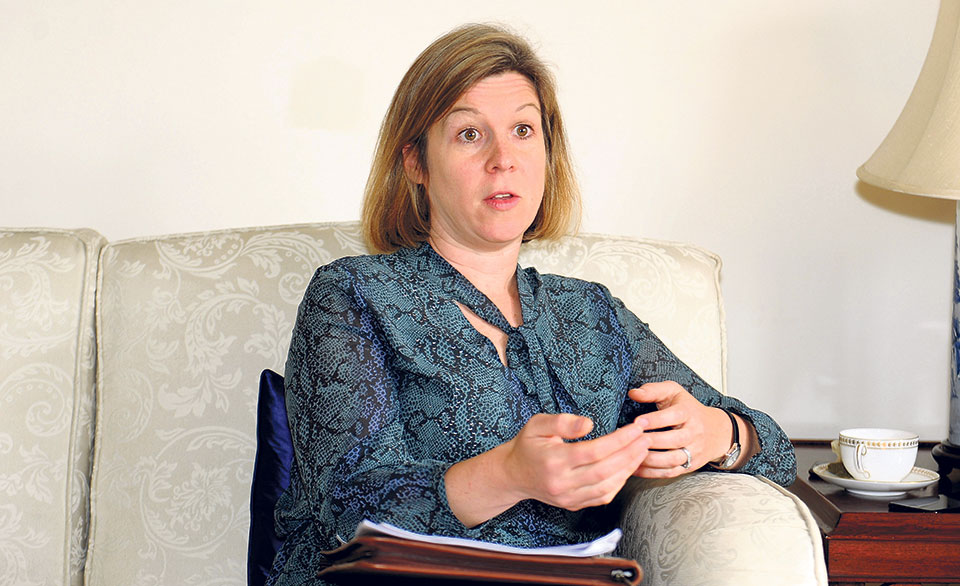
Nepal-UK relations go back to centuries and the UK remains Nepal’s one of the largest donors and development partners. At the same time, the British Gurkhas have often expressed grievances against the UK government over pension issue. Why does the issue remain unresolved? How will the UK support Nepal in its federalization process and Visit Nepal 2020? How is the UK watching Nepali politics, including the issue of transitional justice process? Nicola Pollitt, British Ambassador to Nepal, shared her perspectives with Republica’s Subhash Ghimire and Mahabir Paudyal on a range of issues.
You were in Nepal some 20 years ago. What are some of the changes you noticed after 20 years?
I was not here for a very long 20 years ago. Back then, I saw quite a bit of Annapurna region in three weeks’ trek. Now I see that there has been massive development in terms of infrastructure. There are many more roads to many more places, including around the parts of Annapurna circuit. In parallel, tourist infrastructures have also been developed. There are hotels, most sophisticated tea houses and eco-lodges of which there were none in 1999. In Kathmandu, I remember riding only rickshaws as there were almost no cars. Now it’s completely otherwise. There are almost all cars.
Nepal-UK relations go back to centuries. What are some of the things we should be working on to further enhance the relations so that the British government could contribute more meaningfully in Nepal’s development efforts?
In two months since I took office, I have had the privilege to meet with the President, Prime Minister and a number of Nepali ministers. When I speak to them, we talk about the question you have just raised. I have got the sense that there is a real feeling of Nepal’s potentials during this period of political stability. I talk to them about three areas of cooperation in particular. First is climate change. Very soon the government of Nepal is hosting Sagarmatha Dialogue. Later in the year in Glasgow, the UK is hosting COP26, in which the international leaders will participate. This is the area where we can support not only Nepal but also the countries in this region to tackle problems climate change has brought, particularly in the Himalayas. We hope to be able to take forward some of the conclusions and messages from Sagarmatha Dialogue to Glasgow in December, 2020. The second area of cooperation is related to trade and investments. Trade between the UK and Nepal is quite low. We like to see that increase. We have a new trade investment officer at the embassy. And we are putting increased emphasis on this area. We already do a lot of support to Nepali business sector through DFID. That will continue. We are trying to explore more trade links between our two countries. The third area is on democracy and human rights. Our government has clearly stated that they want to promote the rule of law and rules-based international system abroad, and it’s a part of my role here to do programs here as well to support the Nepal government in embedding democracy, federalism and on those areas I mentioned.
The DFID is Nepal’s one of the biggest bilateral donors. Do you think the resources you put in here have given the expected results?
We have been putting in the development assistance for many many years. The UK is the biggest donor to Nepal. I think UK’s assistance has contributed to Nepal’s development. During the periods of instability, our assistance was very much focused on supporting people of the poorest areas and communities. We still do that but increasingly we are trying to adapt our aid to support the priorities of the Nepal government. So we are running programs which support the new federal structure.
There are always things which can be done better. We have the dialogue with the government for better outcome of our assistance. There are areas where we would like to see much better outcomes but generally we feel our aid is reaching the right people in the right way.
One of the sticking points in ties between Nepal and the UK has been Gurkha’s pension. Some of the veterans are going to launch agitation over what they call unequal pension. Why has this issue not been resolved for many years?
Yes, there are some grievances. The British government feels that the terms in which the Gurkhas serve are very good. Now they serve on exactly the same terms and conditions as the British soldiers. And all Gurkhas since 1994 have exactly the same pension arrangements as the British soldiers. This has been the case for the last 25 years. Nearly 90 percent of the Gurkha pensioners actually receive the same or more than their British counterparts because they receive it earlier. I mean Gurkhas can receive the pensions after 15 years of service. The British soldiers usually have to wait until they are 60 or 65. So I think the pensions for the Gurkhas are very fair.
Gurkhas have served our country for years and the UK government and the public is grateful to them for that. Before I came here, one thing the people wanted to talk to me about the most, with a sense of pride and gratitude, was the service the Gurkhas have provided to the UK. I would always like to reiterate that.
But the grievances related to pension have always existed. Why is the case?
We have a regular dialogue on this. We have in the past put together a task force and specific group to look at this. We talk to government ministers from our side. We also speak to Gurkha pensioners and veterans’ associations themselves. There is an organization which represents these veterans with whom we have a regular dialogue. We think we need to do more to try to understand some of the concerns and grievances but this is not to say we will be able to solve all of them. Some of them, for example, a demand for retrospective pension increases, are simply not possible to address because it will open up demand by other UK public servants and the British public servants to go back to 1948 for retrospective increases to all of their pensions. That’s not something the British government can afford financially. Thus there are some demands that won’t be possible for the UK government to address. There are few grievances which I have heard but which certainly are not true. On this, we should be talking more to try and make our position understood regarding how much we are doing for the Gurkha pensioners.
When I visited Nepal before I took up my role of ambassador, I had gone to see some of the medical facilities that are providing support to the Gurkha veterans in the villages of eastern Nepal. The primary medical care we offer is exceptional. It’s at least as good as we offer in the UK. It’s an offer to all Gurkha pensioners and their widows. We pay for the large amount of secondary medical care for those pensioners as well. We have done our best to provide services to the Gurkhas and their communities in Nepal, particularly around medical care. This is one example of how deeply we care about the Gurkhas.
There has been some discussion among some of the parties that Gurkha recruitment system should no longer be continued. What is your take on this?
Like I said, the Gurkhas have made an outstanding contribution to the British Army. And we are proud of that. We recruit Gurkhas on an annual basis. And there is a high level of interest among Nepali youth in securing a career in the British Army, with everything that comes alongside that. We plan to continue recruiting on an annual basis.
During his visit to the UK in June, 2019, Prime Minister KP Sharma Oli is said to have discussed revision of Nepal-India-UK Tripartite Agreement on Gurkha recruitment with British PM Theresa May. The British side is said to have declined the proposal. What is the truth?
I was not there but my understanding is that Nepali Prime Minister raised the issue and that the British Prime Minister agreed to consider the matter. It was not reported in the joint statement because, I think, they did not agree on anything there and then. But as you know, since that meeting Brexit has very much dominated British politics. And then there was an election and the new government was formed. We are expecting to go back to the Nepali government with our views on this soon. So like I said, my understanding is that Nepali prime minister raised the issue and we said we would consider his proposal and we are doing that at the moment.
Since India included Nepal’s Kalapani, Lipulekh and Limpiyadhura areas in its official map in November, some have argued that Nepal should seek British mediation on this matter. How can the UK help?
Our view is that Nepal and India are neighbors with close relationships for many many years. They should, as I think they have been doing, sit down and discuss the issue bilaterally. In our view there is no role for the UK to play on this issue. It’s for Nepal and India to discuss.
The major reason for this call is the Sugauli Treaty of 1816 between Nepal and British India which set the boundary of Nepal and which clearly state that those areas belong to Nepal.
I understand that historical context and the points raised on this basis. But Nepal is a sovereign country as is India. We are in 2020 now. Probably going back to 1816 and getting the British involved, in our view, would not be helpful. We have no plans to play a role.
In the last two months, you have met with a lot of Nepali politicians and interacted with people. What is your sense of Nepali politics?
I have been meeting with a number of ministers. There is this sense of potential stemming from political stability. The UK wants to do what we can to support the government. We have big aid projects and we continue to talk to the government about this. Nepal has a really strong constitution with lots of excellent rights enshrined in it. One of the things that lots of people have spoken to me about is the need for its effective implementation. We have been speaking to the government about how to support capacity building at local and provincial levels, which is one of the needs the government has identified. There are lots of work to do in Nepal and lots of areas in which we can help to embed the constitution and federal system. I have the confidence that Nepal will continue to develop and not just the UK but other international partners will be able to support that.
You recently met with our attorney general and raised concern about ongoing transitional justice process. How do you see Nepal’s TJ process?
I have seen the debate here and I have discussed a bit with the Attorney General and with other colleagues. For the UK, human rights and democratic space and freedom are very important. We have a clear message from our government in London that the UK sees its role in promoting these values internationally. It is in this context that I have had these conversations. It’s for Nepal, Nepali government and all of the political parties involved to decide how best to take the TJ process forward. We would like to see victim-centric approach and that it would be in line with international practice in these areas. At the same time, we recognize that these things take time and it is not easy. Such process anywhere in the world takes time. It is our role to support in any way we can but without interfering in what must be the Nepali process.
How do you see the election of Agni Prasad Sapkota as the Speaker of the House of Representatives, especially when a case is pending against him at the Supreme Court?
It is for the government of Nepal to appoint a Speaker according to Nepal’s process and laws. In the UK, however, it would not have been possible to appoint a speaker or to become an MP for a person who was under investigation for such serious allegations. Like I said, it’s up to the Nepali government how to and whom to appoint a Speaker but it simply would not have been possible in the UK.
The government has been criticized for drafting several bills that could potentially curtail freedom of expression and press freedom.
The UK is a strong supporter of the freedom of the press. This is one area of democratic freedom we support and promote across the world. I think the press and media freedom in Nepal is pretty good relative to others in the region. And we are keen to do what we can to make sure that those freedoms continue. I was pleased to see that there is a debate going on some of those bills in the parliament. A lot of legislations have not yet been passed. We hope to see further debate and further consultations happen on those bills. And then it’s for the elected members of the parliament to decide what they should pass. From the UK’s perspective, like I said, human rights and democratic space are very important. We understand that it takes time to institutionalize democracy. In the UK, our democracy is hundreds of years of old. Yet there are times when we don’t get things right. Nevertheless, we are keen to support and continue to see the Nepal government do as much as possible to protect human rights.
But do you see those legislations as troubling signs for Nepal’s press freedom and democracy?
Like I said, we encourage the government to do as much as possible to protect human rights and press freedom. What’s important is that those bills are properly debated in the parliament and there is enough consultation. In the UK, we have consultations for weeks before passing the laws.
Has your government communicated this message with the government of Nepal formally?
Not really. We had a human rights ambassador here last week. She is a deputy permanent representative in Geneva but she is also a human rights ambassador-at-large. She spoke to some of the parties and journalists. She was trying to get an understanding of human rights and democracy picture in Nepal. She was certainly able to ask questions and to put across the importance the UK attaches to human rights. But it would not be true to say that we have formally put in a kind of complaint against the government. That’s generally not the way we do things though we had discussions with the ministers and other government officials.
The Brexit has finally happened. How will it impact Nepal-UK relations and trade?
In practice, in the immediate term there will be a transition period right through the end of this year. We will see very little changes during that period because we have negotiated an agreement with the EU that allows us to leave without immediate changes. That gives the British government next 11 months to negotiate not just agreements with the EU but also with other countries where we are approaching under a new agreement. For Nepal, I don’t see Brexit bringing big changes. The UK will have big aid budget here. It will continue to promote human rights, democracy and free trade. We are ready to work on how to increase trade and investment. Generalized System of Preferences (GSP) is an area which especially touches on Nepal. This trade preference arrangement is under the EU at the moment and it will continue to be until the end of this year. But in the course of this year, the UK will be looking to negotiate a bilateral GSP arrangement and I hope that will include Nepal.
How will Brexit affect the Nepalis who are working and studying in the UK?
We recently revised our visa rules to allow some work period after studies. I think it’s good for Nepali and others international students in the UK. One of the criticisms we had received was that people could study but then did not have the opportunities to make anything after studies. They now continue to have two years period during which they can work in the UK. In the course of this year, the government will be designing a points-based system and we expect that to be in operation from the end of 2020 or the beginning of 2021. At the moment, we don’t know what that will exactly look like but we will discuss with the Nepali government as we develop it.
It’s Visit Nepal Year 2020. How can the UK government and the embassy here contribute to this mega celebration?
I met the tourism minister recently and we discussed our support to Visit Nepal Year 2020. Politically, we have given our support. I can play an advocacy role. Our support for tourism industry will continue. I have also been in touch with Nepali ambassador in London because that’s actually where the market is. The Brits who are already here have seen the beauty of Nepal and know exactly why they have come. We need to target the people in the UK. I have been talking about how I can contribute whether through Nepali embassy in London or through some of the contacts in the travel industry. We are looking at various ways in which we can support.
What is your sense of the Nepali people?
I have found Nepali people incredibly friendly. Perhaps everyone says that about Nepali people but it is true in my case. I have found Nepal a very easy place to settle in. Everyone has made me feel very welcomed. It’s been a great place to come. This is my first ambassadorship and I feel very lucky to be able to do so in Nepal where we are made to feel very welcomed. Dal bhat has become my favorite food and my children like it too.
You May Like This
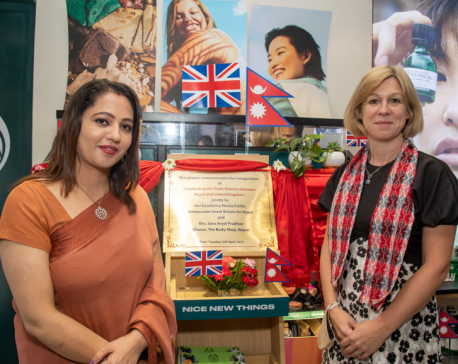
Celebrating the trade relation between Nepal and United Kingdom
Sashi Incorporation and Investment Pvt Ltd organized an event to celebrate the trade relationship between Nepal and United Kingdom on... Read More...
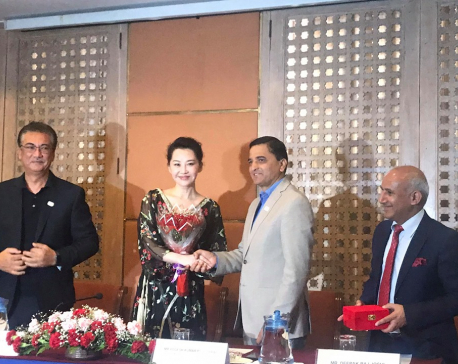
Chinese actress Xu Qing appointed as goodwill ambassador for promotion of Visit Nepal 2020
KATHMANDU, Oct 19: Chinese actress Xu Qing has been appointed as a goodwill ambassador of Nepal for the promotion of... Read More...

Minister Pokharel urges all to visit Nepal
KATHMANDU, July 16: Minister for Education, Science, and Technology, Girirajmani Pokharel, has called the world community to visit Nepal. ... Read More...





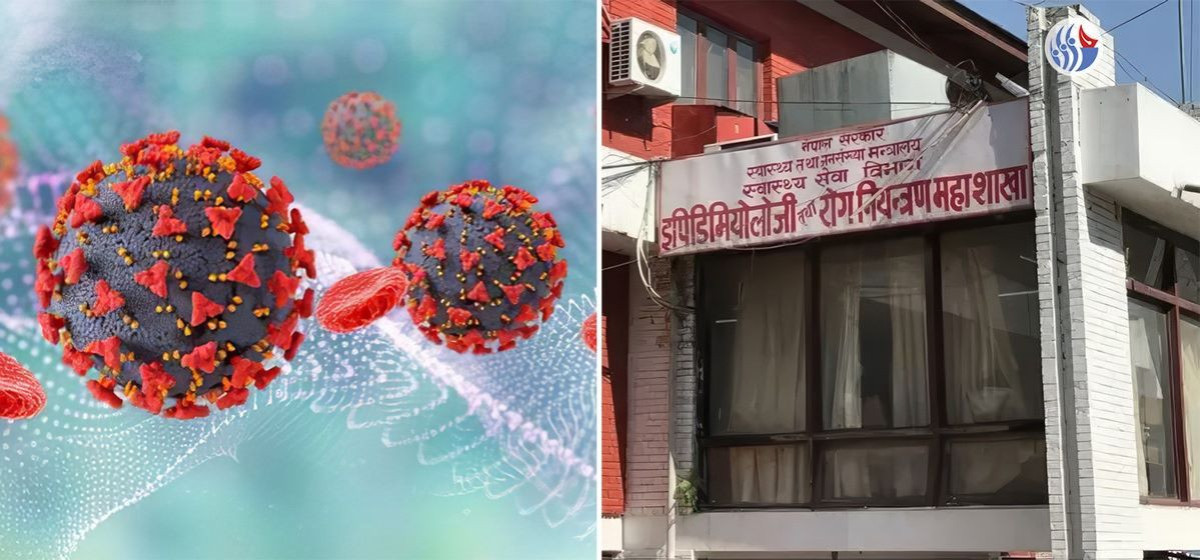
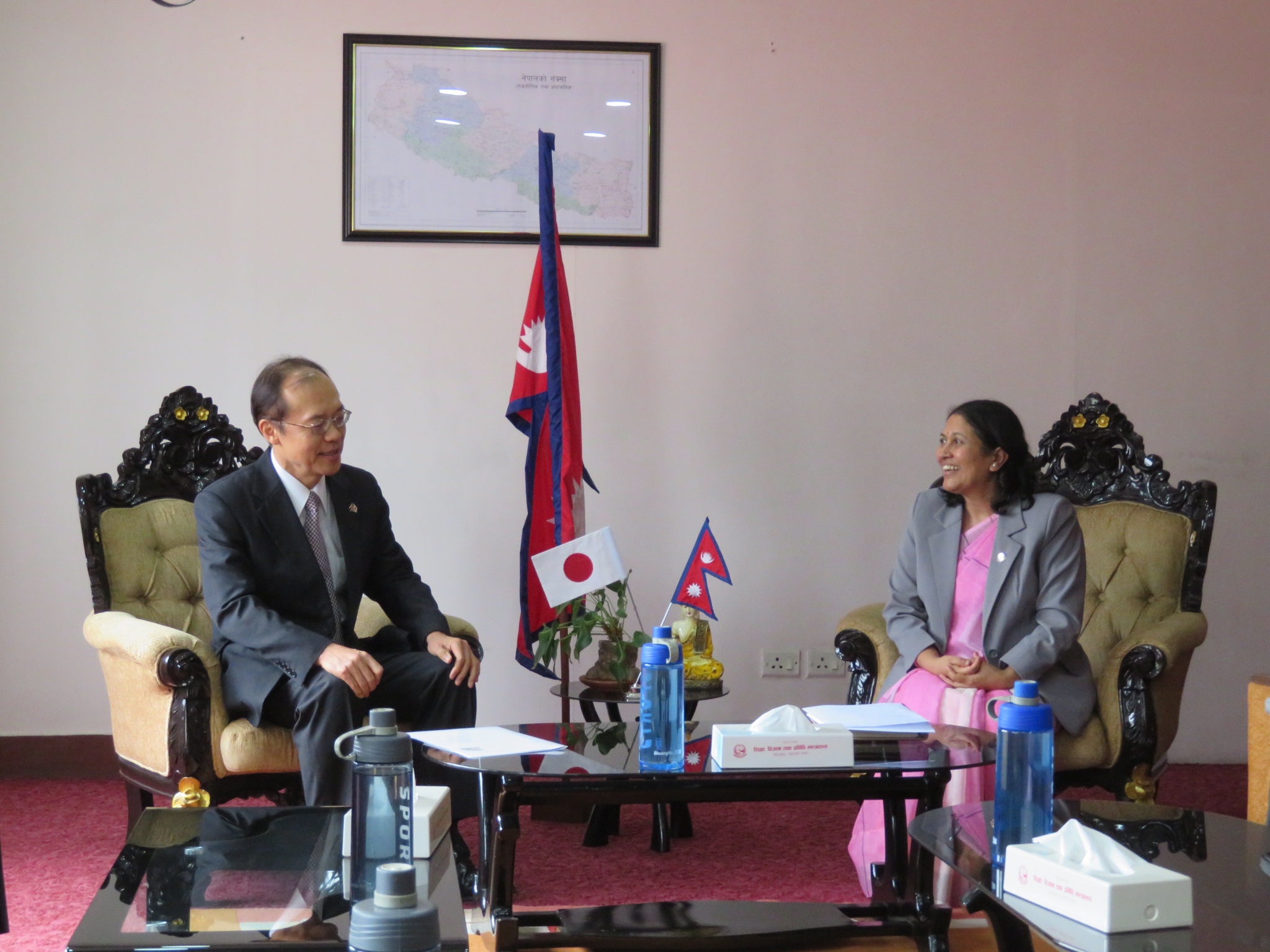




Just In
- Nepal at high risk of Chandipura virus
- Japanese envoy calls on Minister Bhattarai, discusses further enhancing exchange through education between Japan and Nepal
- Heavy rainfall likely in Bagmati and Sudurpaschim provinces
- Bangladesh protest leaders taken from hospital by police
- Challenges Confronting the New Coalition
- NRB introduces cautiously flexible measures to address ongoing slowdown in various economic sectors
- Forced Covid-19 cremations: is it too late for redemption?
- NRB to provide collateral-free loans to foreign employment seekers







Leave A Comment